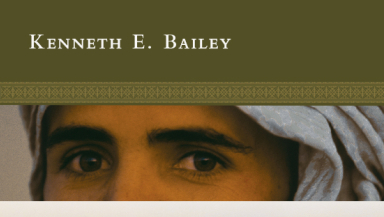Every so often, a new look at an old story opens our eyes to a new meaning.
One of these old stories is the Parable of the Ten Minas in Luke 19, also known as the Parable of the Pounds; in Matthew 25:14-30 the 'minas' are 'talents' (a talent was worth 60 minas).

Anyone who has been going to church for a while will have heard a sermon on this. It's about the gifts God has given to us and the importance of using them wisely rather than burying our 'talent' in the ground.
Well, perhaps; but there's another way of looking at this.
In his book Jesus Through Middle Eastern Eyes, Kenneth Bailey points out the significance of what the ruler said before he left on his journey abroad. He gives 10 minas – the equivalent of about 100 days wages – to 10 of his servants and says, 'Put this money to work until I come back.'
What Bailey – a biblical scholar and linguist who lived in the Middle East for many years – points out is the meaning of the words often translated 'until'. 'En ho' in Greek literally means 'in which'. It can mean 'until', but it can also mean 'because'.
So Bailey suggests reading the master's command as: 'Engage in trade in a situation in which I am coming back.'
In the real world in which the parable is set, King Herod the Great had undertaken a journey from Judaea to Rome in his succesful quest to be made king. His son Archelaus had also made that journey, but unsuccessfully. In the parable, enemies follow the ruler and brief against him.
The picture is of an unstable, dangerous political situation in which the smart thing to do would be to bury the money and lie low until it's clear who's come out on top.
So when the ruler tells his servants to 'Engage in trade in a situation in which I am coming back,' he is asking them to demonstrate their loyalty to him and their trust in him. He is not really interested in whether they make money, but in whether they are faithful.

And Bailey tells of how when he worked for with the Lutheran Church of Latvia at its seminary in Riga, he asked them what questions they put to those who applied to study there. 'They told me, "The most important question is, when were you baptized?" And I asked, "Why is the date of baptism such an important question?" They answered, "If they were baptized during the period of Soviet rule, they risked their lives and compromised their futures by being baptized. But if they were baptized after liberation from the Soviets, we have many further questions to ask them about why they want to become pastors.'
Seeing the Parable of the Minas, or Talents, like this makes us ask a different question of ourselves. It's not, 'Am I dutifully using the gifts I have been given?' but, 'Do I really believe in the One who gave them?' And – at a time when in the West at least the currents of our culture are running against the Christian faith – am I prepared to risk everything for him?
'Jesus Through Middle Eastern Eyes' is published by IVP.













